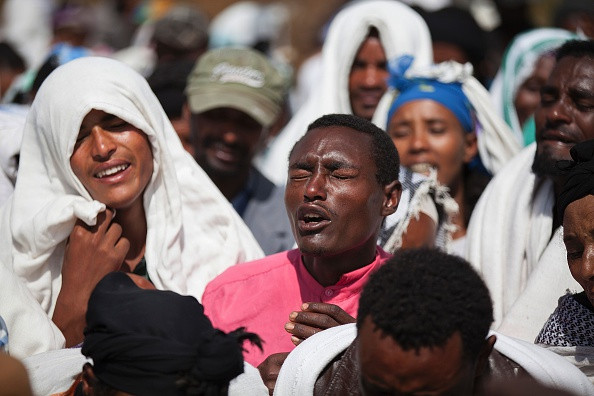Amhara and Oromia unrests: Why are Ethiopia's largest ethnic groups protesting?
Dozens feared dead during protests over disputed territories and human rights issues.
Ethiopia has witnessed a rise in protests in the north-western region of Amhara and in Oromia state, in the country's south. Reports claim that clashes between police and protesters in both regions have resulted in alleged deaths and dozens of arrests.
Amhara unrest
Anti-government protests erupted in Amhara earlier in August, when thousands took to the streets of Gondar and Bahir Dar to protest over the administration of disputed territories. Members of the Welkait Tegede community are demanding their lands be administered by the Amhara region, instead of the Tigray state.
These territories used to be part of Amhara, until the political coalition known as the Ethiopian People's Revolutionary Democratic Front (EPRDF) introduced a federal system and restructured the region including the areas into the Tigray region.
Protesters, who identify themselves as ethnic Ahmara - Ethiopia's second largest group - clashed with police during the demonstrations, labelled as the biggest anti-government unrest Ethiopia has witnessed in recent history.
Police fired tear gas and shot in the air to disperse thousands of people who shouted anti-government slogans. Authorities accused protesters of attacking public properties and said at least seven people died during the unrest, which entered its third day on Sunday (7 August).
However, both witnesses and Amnesty International claimed at least 30 people were killed in Bahir Dar.

Oromo protests
Oromo activists, opposition members and Amnesty have claimed that at least 67 people were killed across Oromia, Ethiopia's largest state, during anti-government protests at the weekend (6-7 August). The demonstrations were the culmination of a wave of unrest that has rocked Oromia in recent months.
Who are Oromo people, Ethiopia's largest ethnic group?
Oromo people flee persecution, arrests and torture at hands of government forces
Deadly protests erupted in November 2015 against a government draft plan − later scrapped − that aimed to expand the boundaries of the capital Addis Ababa. Oromo people feared the plan would result in the confiscation of land owned by farmers, who would become impoverished as a result.
Demonstrations are still occurring today, although less frequently, with people calling for self-rule, the liberation of political prisoners, the end of what they perceive as "military regime" in the region and the cessation of an alleged crackdown by security forces on "peaceful and unarmed" demonstrators, mainly students and farmers.
Activists and human rights organisation have accused authorities of killing some 400 people since the protest started. The government has always denied the allegations of violence and claimed that legitimate protests had been infiltrated by people who aimed to destabilise the country.
"Having been tired of only counting the dead, Oromo activists called a grand Oromia wide public demonstration, dubbed #GrandOromiaRally, last Saturday, to call on the government to stop the killings and release the thousands it arrested," an Omoro activist told IBTimes UK.
"The rallies were a great success. People came out in their thousands each in over 200 towns and cities across Oromia including the capital Addis Ababa and other major regional cities like Adama and Dire Dawa," the activist, who spoke on condition of anonymty, continued.
There is no apparent connection between the two waves of demonstrations, but members of both communities have shown support for each other's causes.
"Demonstrators in Grand Oromia Rally hailed slogans that show solidarity to the Amhara Protests, and those who came out on Amhara Protests hailed slogans that show solidarity with the #Oromo Protests," the activist explained.
Government's response
Reports claimed the government blocked internet access during the demonstrations that occurred at the weekend.
The Ethiopian embassy in London has not responded to a request for comment on the allegations. However, the state-affiliated Fana Broadcasting Corporation (FBC) reported authorities as blaming foreign enemies for the recent unrest and deemed the recent protests as illegal.
"The government is aware that the ideas and slogans reflected in the demonstrations do not represent the people of Oromo or Gondar," Prime Minister Hailemariam Desalegn said in a statement.
© Copyright IBTimes 2025. All rights reserved.






















